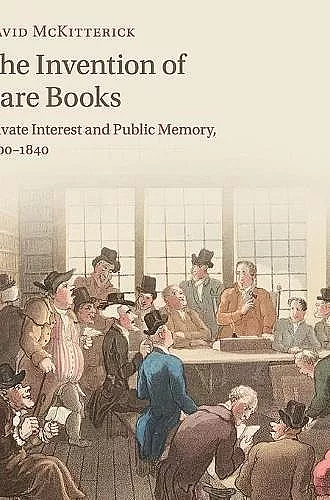The Invention of Rare Books
Private Interest and Public Memory, 1600–1840
Format:Hardback
Publisher:Cambridge University Press
Published:12th Jul '18
Currently unavailable, and unfortunately no date known when it will be back
This hardback is available in another edition too:
- Paperback£23.99(9781108449335)

Explores how the idea of rare books was shaped by collectors, traders and libraries from the sixteenth to the nineteenth centuries.
When does a book that is merely old become a rarity and an object of desire? David McKitterick examines, for the first time, the development of the idea of rare books, and why they matter. Studying examples from across Europe, he explores how this idea took shape in the sixteenth and seventeenth centuries, and how collectors, the book trade and libraries gradually came together to identify canons that often remain the same today. In a world that many people found to be over-supplied with books, the invention of rare books was a process of selection. As books are one of the principal means of memory, this process also created particular kinds of remembering. Taking a European perspective, McKitterick looks at these interests as they developed from being matters of largely private concern and curiosity, to the larger public and national responsibilities of the first half of the nineteenth century.
'McKitterick's impeccable scholarship and the insights and experiences of the contributors to Collecting the Past are major contributions to our understanding both of book history and of the history of the institutions which are themselves a part of that history.' John Feather, Library and Information History
'The Invention of Rare Books, is essential and fascinating reading … Deeply researched and engagingly written, this study is cultural, social, economic and intellectual history thoughtfully stitched and gathered together.' Journal of the Edinburgh Bibliographical Society
ISBN: 9781108428323
Dimensions: 253mm x 182mm x 26mm
Weight: 1070g
460 pages